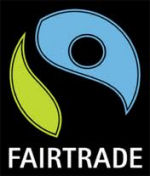READER’S EDITORIAL: WHY LA MESA SHOULD BECOME A FAIR TRADE TOWN
 By Deanna Gullo, Secretary, Fair Trade San Diego
By Deanna Gullo, Secretary, Fair Trade San Diego
October 27, 2011 (La Mesa)--Even though the Tuesday October 11 vote before the La Mesa City Council did not result in the passage of a Fair Trade Town resolution, La Mesa Fair Trade and Fair Trade San Diego welcome this opportunity to further educate La Mesans and the larger San Diego community on what Fair Trade is as well as what it means it means to be a Fair Trade Town.
Defining what fair trade is can be difficult as it is a complex worldwide movement with a number of significant key organizations unified in their efforts .The Fair Trade movement is dynamic and growing by leaps and bounds every day as more people desire to consume products that were not made under sweatshop conditions or by other exploitative means such as child or slave labor or that jeopardize the environment.
Fast Company recently reported that there are over 10,000 Fair Trade products on U.S. store shelves, and that in the second quarter of 2011, sales of Fair Trade certified products jumped 63%. Many working conditions under our current world trade system lock workers worldwide into grinding poverty keeping many from providing themselves and their families with even the basics of food and shelter not to mention health care and education.
Fairtrade International or FLO, which is the world certifying body for most Fair Trade products, defines Fair Trade as “an alternative approach to conventional trade and is based on a partnership between producers and consumers. It allows producers the opportunity to improve their lives and plan for their future. Fairtrade offers consumers a powerful way to reduce poverty through their every day shopping.”
When a product displays FLO’s FairTrade label it means the producers and traders have met Fair Trade Standards which are set by FLO. The Standards are designed to address the imbalance of power in trade relationships and unstable markets. Most products have a Fair Trade minimum price that must be paid to the producers and an additional Fair Trade Premium is paid to invest in their community’s development.
Fair Trade labeling initiatives are national organizations that market Fair Trade and license companies to use the Fair Trade label on products in their country. There are currently Fair Trade labelling initiatives covering 23 countries in Europe, North America, Japan, Australia and New Zealand. In the US Fairtrade USA is the major labeling initiative and has a unique label that it licenses to importers who sell products certified by FLO.
Due to the differences in production methods of handicrafts certification of these products imported into the US is carried out by the Fair Trade Federation. Due to the increasing demand for Fair Trade products and the growing interest in ethical consumption, more recently other certifiers and labels such as Fair For Life in the US have emerged. There are many other organizations that while not Fair Trade certified by one of the above mentioned bodies do engage in fair trading practices with producers. Due to the growing interest in Fair Trade, the number of certifying bodies has not completely caught up to the number of producers and traders interested. Others opt to stay outside of the formal Fair Trade system.
According to Fair Trade Towns USA, “The Fair Trade Towns designation provides a platform for continued outreach and education to build the Fair Trade movement locally and deepen each community’s commitment to international justice”. Passing a city council resolution is one of the last stages in the process of becoming a Fair Trade Town and is a recognition of support for organizations such as La Mesa Fair Trade to promote consumption of Fair Tradecertified productsand educate on their impact. A city council resolution is not an endorsement of any particular local business.
Fair Trade as a tool of development and poverty eradication has caught the interest of many university level researchers and the findings and opinions of researchers can at times be contradictory. These ongoing investigations can only serve to improve and strengthen the entire Fair Trade movement as players along the spectrum learn lessens on what aspects of Fair Trade are most effective in reducing poverty and developing communities and what aspects need to be improved or changed.
We invite La Mesa and San Diego into the discussion as we all seek to make our local and global communities better places in which to live. Fair Trade San Diego along with a very dedicated steering committee of La Mesa residents has been working for months to meet the criteria to make La Mesa a Fair Trade Town. Many successes have already been achieved and local supporters have emerged.
The opinions in this editorial reflect the views of the author and do not necessarily reflect the views of East County Magazine. To submit an editorial for consideration, contact editor@eastcountymagazine.org.
